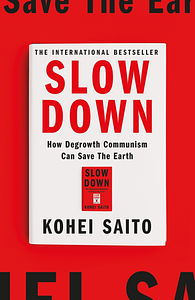Take a photo of a barcode or cover
challenging
informative
inspiring
reflective
medium-paced
hopeful
informative
reflective
medium-paced
Das Buch, das Werk, hat mich echt zum Umdenken gebracht. Jetzt nicht zu geoßes Umdenken, da es von ML jetzt nicht super weit zum Öko-Marxismus ist, aber die Argumentation des Autors hat mich doch durchaus abgeholt und einige Aspekte, die ich wohl in mein tägliches Denken und Theoriewissen, mit einbauen werde.
Die Grundthese ist, dass Marx‘ Produktivismus und somit mehr oder minder auch der historische Materialismus, wie er typischerweise gedeutet wird, nicht ausreichen, bzw. das falsche Element ist, um den Klimawandel zu stoppen und somit die größte globale Krise abzuwenden.
Ich mache hier keinen riesen Exkurs in das Thema, kann aber viele Punkte sehr gut nachvollziehen und lasse mich sogar dazu hinleiten insoweit mitzugehen, dass eine Art „Degrowth-Kommunismus“ womöglich das einzige Mittel ist, die Widersprüche in unserer Gesellschaft zu besiegen.
ML z.B. schützt uns mMn nicht vor den Folgen der Klimakatastrophe und sorgt somit womöglich auf lange Sicht für neue Widersprüche in unserem Leben, spätestens sobald hunderte Millionen Menschen unter den Folgen dieser Katastrophe leben und leiden.
Daher ist eine „Anhebung“ aller Länder auf ein gewisses Wohlstandslevel zwar wünschenswert, dieses muss jedoch innerhalb unserer planetaren Grenzen liegen.
D. h. es muss auch zu einer Art des Degrowth in den Kapitalismus profitierenden Staaten kommen.
Doch ein kleiner Exkurs, aber ich fand’s echt gut.
Ich glaube nur leider, dass es nicht so mega barrierefrei verfasst wurde, obgleich sich der Autor Mühe gegeben hat, manche Punkte zu wiederholen, was das Lesen einfacher macht.
Die Grundthese ist, dass Marx‘ Produktivismus und somit mehr oder minder auch der historische Materialismus, wie er typischerweise gedeutet wird, nicht ausreichen, bzw. das falsche Element ist, um den Klimawandel zu stoppen und somit die größte globale Krise abzuwenden.
Ich mache hier keinen riesen Exkurs in das Thema, kann aber viele Punkte sehr gut nachvollziehen und lasse mich sogar dazu hinleiten insoweit mitzugehen, dass eine Art „Degrowth-Kommunismus“ womöglich das einzige Mittel ist, die Widersprüche in unserer Gesellschaft zu besiegen.
ML z.B. schützt uns mMn nicht vor den Folgen der Klimakatastrophe und sorgt somit womöglich auf lange Sicht für neue Widersprüche in unserem Leben, spätestens sobald hunderte Millionen Menschen unter den Folgen dieser Katastrophe leben und leiden.
Daher ist eine „Anhebung“ aller Länder auf ein gewisses Wohlstandslevel zwar wünschenswert, dieses muss jedoch innerhalb unserer planetaren Grenzen liegen.
D. h. es muss auch zu einer Art des Degrowth in den Kapitalismus profitierenden Staaten kommen.
Doch ein kleiner Exkurs, aber ich fand’s echt gut.
Ich glaube nur leider, dass es nicht so mega barrierefrei verfasst wurde, obgleich sich der Autor Mühe gegeben hat, manche Punkte zu wiederholen, was das Lesen einfacher macht.
hopeful
informative
inspiring
reflective
fast-paced
challenging
informative
medium-paced
challenging
hopeful
informative
medium-paced
challenging
informative
inspiring
reflective
medium-paced
dark
informative
lighthearted
reflective
medium-paced
This book is an interesting introduction to socialist and degrowth ideas, and how they combine. The link it shows between climate change and imperialist exploitation and plundering is also very important. It is also well-written and easy-to-understand for people who are new to these ideas. However, while the book heavily goes into Marxist ideas, it completely dismisses historical materialism (Saito says late Marx changed his mind on this, however he provides very little evidence for this and it is very hard to believe considering how crucial it is to Marx' entire ideology) and Marxist ideas about revolution, some of the most important and crucial to understanding how socialism can actually happen. What is left is quite a utopian and idealistic vision. "If everyone just did this, we could save the world", while true, it is also not going to happen. This means the book basically proposes "Utopian Socialism", a vision of socialism that Marx and Engels both emphatically rejected, opposing it to their own "Scientific Socialism" (see "Socialism: Utopian and Scientific by Friedrich Engels). These utopian ideas are also presented as if they were Marx', even though he rejected them. His argument for why Marx supported degrowth is also unconvincing in my opinion, even though a large part of the book rests on the strength of this argument. His arguments against capitalism and in favor of degrowth in general are quite strong, though (but of course I would say that, I already supported these ideas before I started reading this book). I think Saito overstates early Marx' productivism, however Saito's critique of this is still interesting and valid.
Saito's socialist vision is not only utopian and reformist. It is also not communist, even though he consistently uses that term. Communism is usually defined as being a "stateless, moneyless, classless" society, based on the idea of "from each according to their ability, to each according to their need", while Saito makes clear in the book that he does not seek to abolish the state and probably also does not want to abolish money. It is closer to another (worse, in my opinion) version of socialism, usually referred to as "Market Socialism". While undoubtedly superior to the current capitalist system, market socialism fails to abolish competitition and markets, which means it would still have many of the problems of capitalism and competitition would still encourage companies to ignore the carbon output of their production. Degrowth seems hard to combine with market socialism. Saito's idea that socialism is less efficient and would inherently cause degrowth/economic shrinkage is also very odd. Capitalism's top-down economic structure requires control and supervision at every level, and decisions are often made by executives who have no clue what they are talking about. Socialism would be way more efficient because of the input employees would have in their own work (and they often understand the work better than the executives), and the elimination of class conflict at work means there would be no need for top-down control of employees anymore.
Overall this book is good as an introduction to degrowth and socialism, but I would recommend people who read this to go further in the communist direction, and read more Marxist works, such as the Principles of Communism (Engels), Communist Manifesto (Marx & Engels) and Workers' Councils (Anton Pannekoek).
Saito's socialist vision is not only utopian and reformist. It is also not communist, even though he consistently uses that term. Communism is usually defined as being a "stateless, moneyless, classless" society, based on the idea of "from each according to their ability, to each according to their need", while Saito makes clear in the book that he does not seek to abolish the state and probably also does not want to abolish money. It is closer to another (worse, in my opinion) version of socialism, usually referred to as "Market Socialism". While undoubtedly superior to the current capitalist system, market socialism fails to abolish competitition and markets, which means it would still have many of the problems of capitalism and competitition would still encourage companies to ignore the carbon output of their production. Degrowth seems hard to combine with market socialism. Saito's idea that socialism is less efficient and would inherently cause degrowth/economic shrinkage is also very odd. Capitalism's top-down economic structure requires control and supervision at every level, and decisions are often made by executives who have no clue what they are talking about. Socialism would be way more efficient because of the input employees would have in their own work (and they often understand the work better than the executives), and the elimination of class conflict at work means there would be no need for top-down control of employees anymore.
Overall this book is good as an introduction to degrowth and socialism, but I would recommend people who read this to go further in the communist direction, and read more Marxist works, such as the Principles of Communism (Engels), Communist Manifesto (Marx & Engels) and Workers' Councils (Anton Pannekoek).
informative
reflective
fast-paced
Super interesting, contextualizes some of the “sustainable economics” discussions I learned in grad school and presented ideas that definitely made me uncomfortable and pushed me to reflect on that discomfort. There were a few times where I felt like it could have developed ideas more. I am also just not the target audience he’s trying to convince of his interpretation of Marx, so I found that those parts didn’t add much to me personally, but overall a very interesting book





